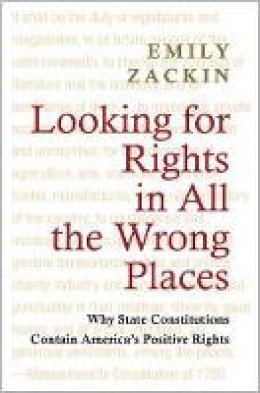
Stock image for illustration purposes only - book cover, edition or condition may vary.
Looking for Rights in All the Wrong Places: Why State Constitutions Contain America´s Positive Rights
Emily Zackin
€ 41.31
FREE Delivery in Ireland
Description for Looking for Rights in All the Wrong Places: Why State Constitutions Contain America´s Positive Rights
Paperback. Series: Princeton Studies in American Politics: Historical, International and Comparative Perspectives. Num Pages: 248 pages, 2 line illus. 8 tables. BIC Classification: 1KBB; JPVH1; LND. Category: (P) Professional & Vocational; (U) Tertiary Education (US: College). Dimension: 235 x 157 x 19. Weight in Grams: 408.
Unlike many national constitutions, which contain explicit positive rights to such things as education, a living wage, and a healthful environment, the U.S. Bill of Rights appears to contain only a long list of prohibitions on government. American constitutional rights, we are often told, protect people only from an overbearing government, but give no explicit guarantees of governmental help. Looking for Rights in All the Wrong Places argues that we have fundamentally misunderstood the American rights tradition. The United States actually has a long history of enshrining positive rights in its constitutional law, but these rights have been overlooked simply because they are not in the federal Constitution. Emily Zackin shows how they instead have been included in America's state constitutions, in large part because state governments, not the federal government, have long been primarily responsible for crafting American social policy. Although state constitutions, seemingly mired in trivial detail, can look like pale imitations of their federal counterpart, they have been sites of serious debate, reflect national concerns, and enshrine choices about fundamental values. Zackin looks in depth at the history of education, labor, and environmental reform, explaining why America's activists targeted state constitutions in their struggles for government protection from the hazards of life under capitalism. Shedding much-needed light on the variety of reasons that activists pursued the creation of new state-level rights, Looking for Rights in All the Wrong Places challenges us to rethink our most basic assumptions about the American constitutional tradition.
Product Details
Format
Paperback
Publication date
2013
Publisher
Princeton University Press
Number of pages
248
Condition
New
Series
Princeton Studies in American Politics: Historical, International and Comparative Perspectives
Number of Pages
248
Place of Publication
New Jersey, United States
ISBN
9780691155784
SKU
V9780691155784
Shipping Time
Usually ships in 15 to 20 working days
Ref
99-15
About Emily Zackin
Emily Zackin is assistant professor of political science at Hunter College, City University of New York.
Reviews for Looking for Rights in All the Wrong Places: Why State Constitutions Contain America´s Positive Rights
One of Choice's Outstanding Academic Titles for 2014 "This is an excellent contribution to the literature and yet another compelling reason that scholars should not limit themselves to only the federal Constitution and courts."
Choice "I am hopeful that Zackin's thoughtful and timely book will invigorate the debate, reminding readers along the way of the vibrant role states have played, and should continue to play, in defining new statutory and constitutional rights. Whether 'we want more' rights or not, we would be lucky to have more scholarship from Zackin about the states' essential role in the American constitutional law tradition."
Jeffrey S. Sutton, Harvard Law Review
Choice "I am hopeful that Zackin's thoughtful and timely book will invigorate the debate, reminding readers along the way of the vibrant role states have played, and should continue to play, in defining new statutory and constitutional rights. Whether 'we want more' rights or not, we would be lucky to have more scholarship from Zackin about the states' essential role in the American constitutional law tradition."
Jeffrey S. Sutton, Harvard Law Review
